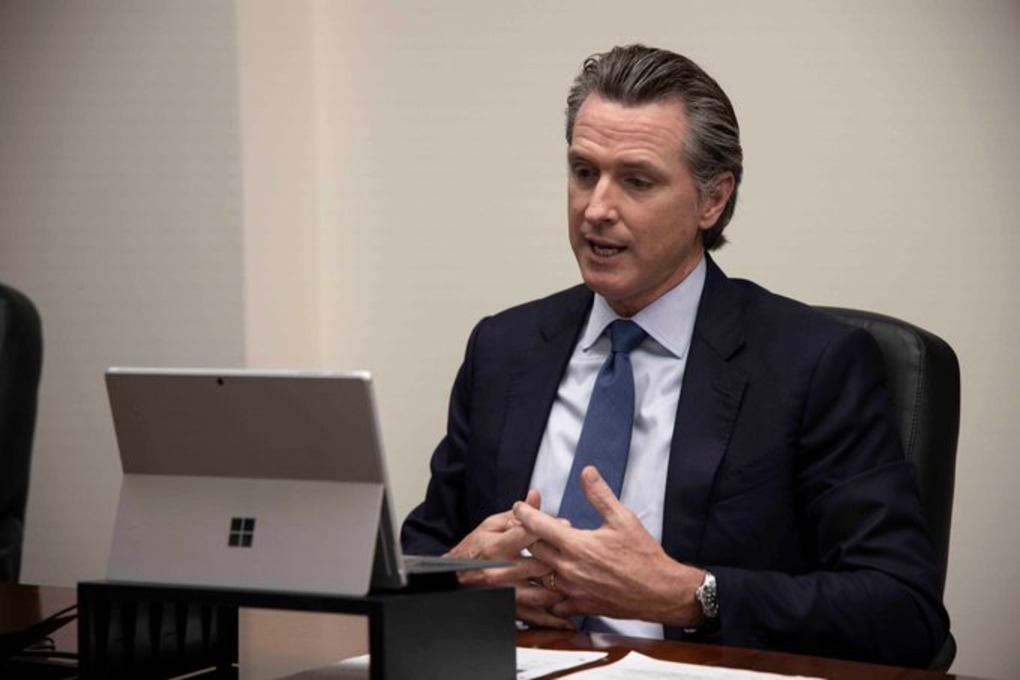Politics
Gavin Newsom Advances Redistricting Efforts to Counter Trump

California Governor Gavin Newsom has made a significant move in response to Donald Trump’s aggressive redistricting campaign by securing approval for a new congressional map. This initiative, known as Proposition 50, allows Democrats to redraw California’s congressional districts mid-decade, potentially adding up to five House seats in their favor. The measure passed in a special election this week, marking a crucial victory for Democrats as Republicans push similar redistricting efforts in states like Texas.
The timing of this victory is critical. With Republicans, fueled by Trump’s influence and GOP-controlled legislatures, pursuing their own redistricting plans, Newsom’s administration viewed California’s action as a necessary countermeasure. The initiative came after intense discussions among Democratic leaders last summer, who initially questioned whether it was feasible to challenge the existing independent redistricting commission in California.
“Unlike Texas, we faced the challenge of needing voter approval and substantial fundraising to make any changes,” a senior Democrat involved in the strategy told The Washington Post. “We didn’t know that it was actually achievable. But we didn’t have the luxury to do anything else but focus.”
In the lead-up to the election, Newsom actively promoted the initiative through social media and public statements. During a notable interview in July, he remarked that California could “gerrymander like no other state.” Following a briefing by Trump on the GOP’s mapping plans, Newsom intensified his rhetoric, stating, “Two can play this game.”
On Election Day, California voters approved Proposition 50, empowering state lawmakers to redraw the congressional map. The campaign for the measure emphasized the need for Democrats to defend against what they perceived as a one-sided Republican redistricting strategy across the nation. Supporters framed the initiative not as a partisan attack but as a measure of self-defense. “We cannot afford to sit back while Republicans redraw America’s democracy,” a senior adviser to Newsom stressed. “California had to lead.”
This victory not only strengthens Newsom’s political position but also offers him a prominent platform as speculation grows regarding a potential presidential run in 2028. The redistricting win enhances his profile and may draw increased support from small-dollar donors.
Republican leaders quickly condemned the move, labeling it a betrayal of California’s commitment to an independent redistricting process. They criticized the initiative as a blatant power grab, coining the term “Newsom-mander” to highlight perceived hypocrisy after decades of advocating for non-partisan maps. One California Republican lawmaker cautioned that the initiative undermines the integrity of the independent commission model.
Even some former California leaders expressed skepticism about the rationale behind the change. A former governor dismissed the idea that the alterations would be temporary, calling promises to restore the commission a “fantasy.”
Despite facing criticism, Newsom’s team remains optimistic about the decision. “Ultimately, it was the governor’s call,” one strategist stated. “People had to jump off the cliff together — and voters caught us.” The approval of Proposition 50 underscores the growing importance of congressional redistricting in shaping the political landscape. With the House majority currently razor-thin, gaining even a few new seats could significantly impact the balance of power in the 2026 and 2028 elections.
In addition to California, Democrats are now encouraging states like Virginia, New York, Illinois, and Colorado to consider similar initiatives. Meanwhile, Republicans continue to refine their maps in states where they hold control, confident they can consolidate their gains.
For Newsom, the implications of this redistricting victory are substantial. He now bears the responsibility of overseeing a process that must withstand legal scrutiny and public criticism, all while under the national spotlight. Following the vote, he asserted that this effort transcends partisan politics. “California will not unilaterally disarm,” he proclaimed. “If others break the rules of fairness, we must ensure our voice — and the voice of our voters — is not diminished.” The outcomes of these actions could play a pivotal role in determining the future control of Congress and shape Newsom’s ambitions on the national stage.
-

 World2 weeks ago
World2 weeks agoCoronation Street’s Shocking Murder Twist Reveals Family Secrets
-

 Entertainment1 week ago
Entertainment1 week agoAndrew Pierce Confirms Departure from ITV’s Good Morning Britain
-

 Entertainment5 months ago
Entertainment5 months agoKate Garraway Sells £2 Million Home Amid Financial Struggles
-

 Entertainment4 months ago
Entertainment4 months agoAnn Ming Reflects on ITV’s ‘I Fought the Law’ Drama
-

 Entertainment1 month ago
Entertainment1 month agoCoronation Street Fans React as Todd Faces Heartbreaking Choice
-

 Health4 months ago
Health4 months agoKatie Price Faces New Health Concerns After Cancer Symptoms Resurface
-

 World1 month ago
World1 month agoBailey Announces Heartbreaking Split from Rebecca After Reunion
-

 Entertainment2 weeks ago
Entertainment2 weeks agoTwo Stars Evicted from I’m A Celebrity Just Days Before Finale
-

 World2 weeks ago
World2 weeks agoKevin Sinfield Exceeds Fundraising Goal Ahead of Final Marathons
-

 Entertainment4 months ago
Entertainment4 months agoCoronation Street’s Carl Webster Faces Trouble with New Affairs
-

 Entertainment4 months ago
Entertainment4 months agoWhere is Tinder Swindler Simon Leviev? Latest Updates Revealed
-

 Entertainment5 months ago
Entertainment5 months agoMarkiplier Addresses AI Controversy During Livestream Response





















